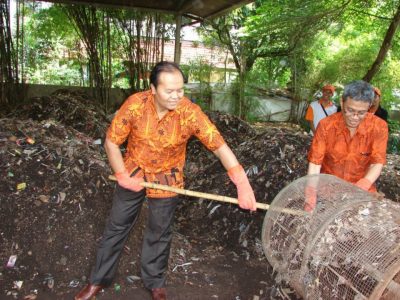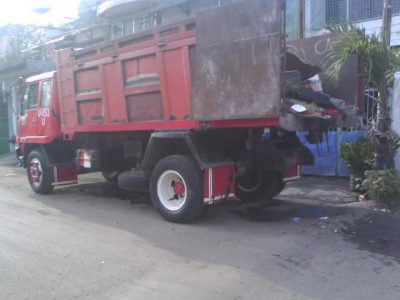The harm of plastic waste in the Indonesian oceans
The lack of awareness about knowledge of plastic waste leads to damaging the oceans.
Indonesia is the 4th largest population in the world. Two hundred sixty-seven million people are living in one country, and each of the people contributes to the disposal of plastic waste every day. According to a report by researcher Jenna Jambeck, Indonesia produced approximately 1.29 million tons of plastic to the oceans, making the country as the second-worst marine polluter in 2010.
This could be because of the lack of discipline and self-awareness toward plastic waste of Indonesian people. However, as an Indonesian myself, I know that governments have promoted educational campaigns frequently. Yet, the public is very resistant to listen to the governments.
According to the Indonesia National Plastic Action Partnership, there is 6.8 million plastic waste that the country produced annually in 2017. The country recycled only 10% of the waste. Other than that, the managed disposals and dumpsites handling the rest of the litter. Whereas the remaining waste that was not collected was dumped to the sea, lakes and rivers all across Indonesia.
Based on a Non-Government Organisation (NGO), Ocean Crusaders, each year, up to 100,000 sea animals and 1 million seabirds die from eating plastic waste. Many ocean creatures, such as whales, sea turtles and fishes mistaken the plastic waste as their food. This could be fatal because the litter stays in their stomach for no definite amount of time and could take their life.
This got me thinking; there are million tons of waste in the Indonesian oceans for these tens of years. Do we have to wait for hundreds of years to realize that the oceans are in danger because of plastic wastes? We as humans need to think the opposite, try to position ourselves who lives in the sea, do you think we could remain alive with dozens of waste in the oceans?
Nevertheless, there are many ways for human beings to play a part in reducing plastic waste and increasing sustainability. We could implement this by starting from a small step, aware of the harms of plastic waste, reduce the use of items that can’t be recycled, and try to practice a sustainable lifestyle to be more environmentally friendly.
That being said, with Indonesia being one of the largest maritime countries in the world, many organisations, from governments or non-governments are trying to tackle the issue about plastic waste that harms the ocean. These organisations are indeed helping the Indonesia marine to be less polluted by waste.
There is one non-government organisation that I have already visited in 2019, it is called Indonesia Solid Waste Association (InSWA). I will tell you my experience when I had a visit to InSWA with my university class.
Indonesia Solid Waste Association
In 2019, one of my tutors took my class to one of the waste associations in Indonesia (InSWA). She considered that going to this organisation will give us a more in-depth understanding of waste management. When we arrived, the staff in the association presented us with a presentation about waste management.
The presentation tells the procedure on how the plastic waste was brought and processed in the InSWA. The waste management program is called Extended Producer Responsibility (EPR). This program aims to focus on polystyrene waste due to the lack of knowledge to manage and process the polystyrene waste for some Indonesia waste associations — specifically the plastic bottles, containers, and stereo foams.
Moreover, we are encouraged to see the storeroom of the dozens of plastic bottles and containers that the processor will be operating. In this room, the plastics are a large pile consisting of mostly plastic bottles. I remember that one of the staff told us even though it is possible, plastic bottles are too unbreakable to be destroyed in the machine. That is why we should have limited or stopped the utilization of plastic bottles in our everyday lives.
Lastly, we move outdoors to see the processor room; the machine in the room is operating the wastes. After the machine processed the wastes, the components became a large pile of soil. The staff gave us information that seven trucks are picking up the litter from only one of the bays in Jakarta, which is in Manggarai Bay every day. I can’t imagine it if other associations put up the wastes from other rivers or lakes, which could take more wastes and lessen the litter from those waters. Plastic wastes in Jakarta waters are innumerable and uncontrollable, yet only a few know how to sort it out.

A person clean up a pile of waste

The wastes are carried in the back of the truck.
Source: Indonesia Solid Waste Association Facebook Page
Those are my experiences in visiting one of the non-government organisations regarding waste management. In the process, I have gained and require more knowledge of how the organisation handle waste management in a discipline and structural way. This makes me realise that some of the associations are conscious and concerned with the issue of plastic waste, that hardly will ever end if the people are still not aware that this problem might end our earth someday.
Despite organisations contributing to lowering the plastic waste, human beings will neglect the problem if they are not mindfully aware of the litter. Hence, humans need to think much further than only the awareness of reducing the use of plastic waste. We need to try to alter our mindset and behaviour on implementing a much better lifestyle for our ocean. Because if it’s not us who take care of the ocean, who else it might be? Remember, one small step for us, one giant leap for the maritime population.
References:
Admin. (2012, December 03). Riset Aplikasi tentang Pengelolaan Sampah. Retrieved October 22, 2020, from http://inswa.or.id/?page_id=121
Indonesia, a top plastic polluter, mobilizes 20,000 citizens to clean up the mess. (2019, December 18). Retrieved October 22, 2020, from https://news.mongabay.com/2018/09/indonesia-a-top-plastic-polluter-mobilizes-20000-citizens-to-clean-it-up/
Indonesia Solid Waste Association (InSWA). (n.d.). Retrieved October 22, 2020, from https://www.facebook.com/Indonesia-Solid-Waste-Association-InSWA-349392981749549/?ref=page_internal
The Jakarta Post. (n.d.). Ineffective recycling compounds Indonesia’s marine waste problem. Retrieved October 22, 2020, from https://www.thejakartapost.com/news/2020/05/10/ineffective-recycling-compounds-indonesias-marine-waste-problem.html
